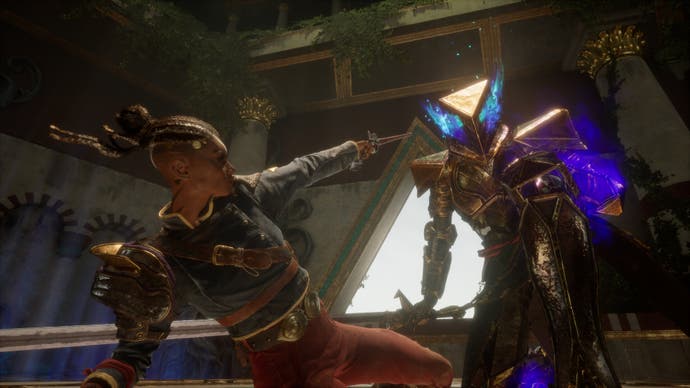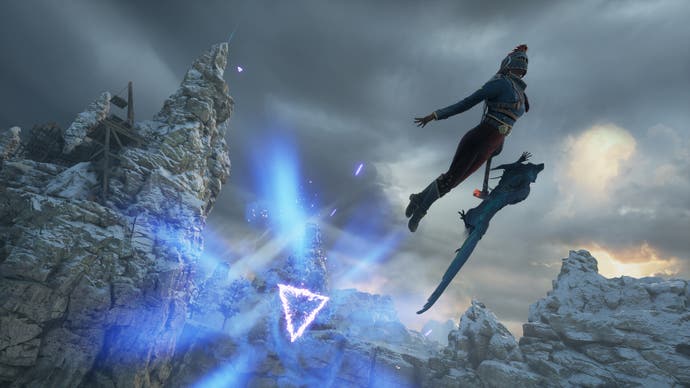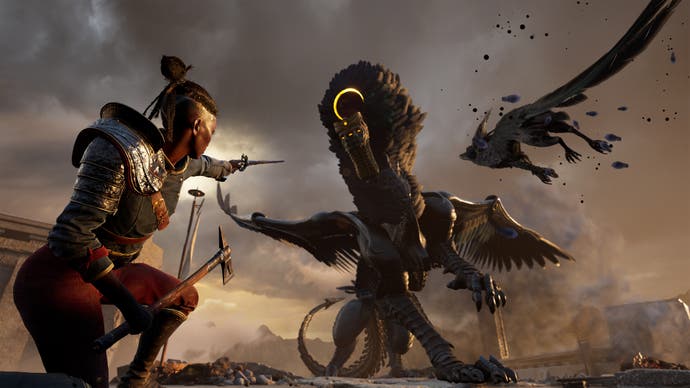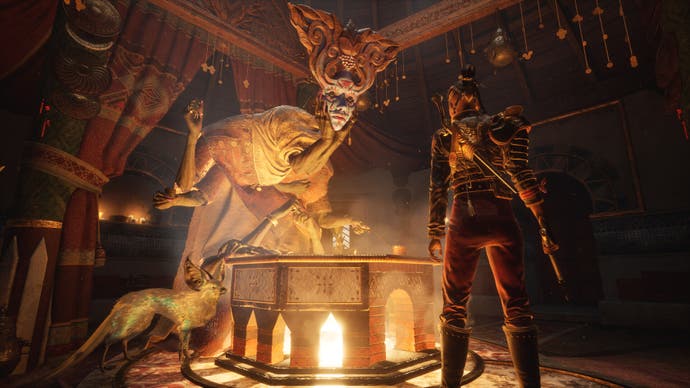Flintlock's breezy visual panache suggests another fine addition to the burgeoning "souls-lite" genre
God of Nor.
A short way into an extended hands-off presentation of Flintlock: The Siege of Dawn, and my main thought was: this feels a lot like a mix between God of War and Souls games, at which point creative director Simon Dasan described it as… more or less exactly that. "A massive thing for us was to try and take that real Soulslike field of action, and then make it more accessible, kind of bring it all together to the masses," he explained, to the sound of main character Nor slashing theatrically through an enemy grunt.
Flintlock, the next game from the New Zealand studio behind Ashen, is breezy and fluid, emphasising movement and offence where typical Souslikes might nudge you towards a more staid defensive dance. But the switch to proactivity is countered by the usual trappings of the genre: a semi-linear world, small numbers of enemies, and combat that, while flashier and faster, still seems to reward precision above all.
Arriving in a crumbling castle courtyard around a third of the way into the game, you find the area subjugated by a god. Battling through some initially typical Soulslike enemies - think zombified dudes in armour - Dasan and co demonstrated a few variations on how exactly that combat works.
At the basic level, there's plenty of dodging between enemy attacks before letting off a brief melee combo of your own. But alongside that you'll find a metre that gradually fills on successful hits - fill this up completely, and your companion, a little chatterbox of a fox god called Enki, can then let off some special attacks, a bit like Atreus in God of War, but with more punch. These specials almost act like an ultimate, executing weaker enemies or ripping the armour off heavier ones.
You'll also need to cycle regularly between melee slashes and a few shots of your Flintlock pistol, which works well as Bloodborne-style combo breaker for staggering enemies and interrupting their flow, while there are other "black powder" based weapons, like longer-range rifles and grenades, that you'll gain access to over time. There's also a classic three-way split of skill trees - powder, magic, and steel - which are largely self-explanatory and govern each of the three key approaches across your guns, Enki-powered special moves, and weapons and armour. There's a loot system, which may cause some groans, but it doesn't appear grindy, instead being based around subtle combos from things like wearing full sets of gear - to me as much a nice excuse to stare at the elaborate 17th century-inspired metal inlays on a fancy shoulder plate as anything else.
It all sounds fairly run-of-the-mill third-person action, and in many ways it is. Flintlock doesn't have many truly new tricks up its sleeve. But there are clever tweaks - a combo system stacks buffs over time as you land ever more attacks for instance, creating a sense of risk-reward to each fight - and there's real magic in the showmanship. Flintlock's short fights are a swirl of particle effects and ultra-fluid animation, while a simple but, at least to my eyes, high satisfying-looking double jump combines to add a sense of weaving flow. This evolves into some actual standalone platforming at times, as I saw Nor darting through the air above the world, as a means of navigation that Dasan referred to as "almost fast-travel".




And the world itself is a treat, lavishly rendered and highly detailed, with some subtle references to the developers' New Zealand home. Art director Marie-Charlotte Derne highlighted specific ferns in more arid areas, and traditional references in the game's little pop-up village settlements, where you'll meet some wonderfully bizarre baristas in local coffee shops, of all things. And there's a specifically New Zealand approach to mountains, which are typically "Nordic" in other video games, the A44 team told me.
Back to the combat, and a climax of the demo sees a boss fight with Rammuha, a swivelling, golden flurry of arms and blades. It seems extremely tough, "It wouldn't be one of these games if the boss wasn't super, super hard," Dosan joked, but this is also where Flintlock's approachability comes to the fore - the loading spot is right before the fight, with A44 intentionally avoiding the "boss runs" full of various pre-bossfight enemies notorious in FromSoftware's originals.
Whether A44's got the balance right will of course come down to the playing. Much of the appeal of Souls games is their challenge, after all, the sense of almost comical masochism combined with unmatched triumph when things go right - those boss runs for instance are there for a reason, to add an extra layer of pressure to the boss fights themselves, less you die and have to go through all that again. But Flintlock, alongside others in the "souls-lite" subgenre like the Star Wars: Jedi games or Death's Door, is a nice reminder that often these things thrive when they evolve beyond their original form. It may not be oppressively bleak or ruinously hard, but it occupies that lovely sweet spot where precision meets a bit of playfulness and flair. And it worked pretty well for God of War.



